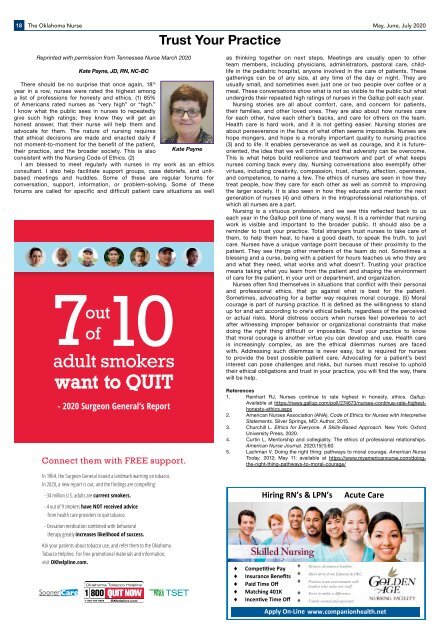The Oklahoma Nurse - May 2020
- No tags were found...
Create successful ePaper yourself
Turn your PDF publications into a flip-book with our unique Google optimized e-Paper software.
18<br />
<strong>The</strong> <strong>Oklahoma</strong> <strong>Nurse</strong> <strong>May</strong>, June, July <strong>2020</strong><br />
Trust Your Practice<br />
Reprinted with permission from Tennessee <strong>Nurse</strong> March <strong>2020</strong><br />
Kate Payne, JD, RN, NC-BC<br />
<strong>The</strong>re should be no surprise that once again, 18 th<br />
year in a row, nurses were rated the highest among<br />
a list of professions for honesty and ethics. (1) 85%<br />
of Americans rated nurses as “very high” or “high.”<br />
I know what the public sees in nurses to repeatedly<br />
give such high ratings; they know they will get an<br />
honest answer, that their nurse will help them and<br />
advocate for them. <strong>The</strong> nature of nursing requires<br />
that ethical decisions are made and enacted daily if<br />
not moment-to-moment for the benefit of the patient,<br />
their practice, and the broader society. This is also Kate Payne<br />
consistent with the Nursing Code of Ethics. (2)<br />
I am blessed to meet regularly with nurses in my work as an ethics<br />
consultant. I also help facilitate support groups, case debriefs, and unitbased<br />
meetings and huddles. Some of these are regular forums for<br />
conversation, support, information, or problem-solving. Some of these<br />
forums are called for specific and difficult patient care situations as well<br />
as thinking together on next steps. Meetings are usually open to other<br />
team members, including physicians, administrators, pastoral care, childlife<br />
in the pediatric hospital, anyone involved in the care of patients. <strong>The</strong>se<br />
gatherings can be of any size, at any time of the day or night. <strong>The</strong>y are<br />
usually small, and sometimes even just one or two people over coffee or a<br />
meal. <strong>The</strong>se conversations show what is not so visible to the public but what<br />
undergirds their repeated high ratings of nurses in the Gallup poll each year.<br />
Nursing stories are all about comfort, care, and concern for patients,<br />
their families, and other loved ones. <strong>The</strong>y are also about how nurses care<br />
for each other, have each other’s backs, and care for others on the team.<br />
Health care is hard work, and it is not getting easier. Nursing stories are<br />
about perseverance in the face of what often seems impossible. <strong>Nurse</strong>s are<br />
hope mongers, and hope is a morally important quality to nursing practice<br />
(3) and to life. It enables perseverance as well as courage, and it is futureoriented,<br />
the idea that we will continue and that adversity can be overcome.<br />
This is what helps build resilience and teamwork and part of what keeps<br />
nurses coming back every day. Nursing conversations also exemplify other<br />
virtues, including creativity, compassion, trust, charity, affection, openness,<br />
and competence, to name a few. <strong>The</strong> ethics of nurses are seen in how they<br />
treat people, how they care for each other as well as commit to improving<br />
the larger society. It is also seen in how they educate and mentor the next<br />
generation of nurses (4) and others in the intraprofessional relationships, of<br />
which all nurses are a part.<br />
Nursing is a virtuous profession, and we see this reflected back to us<br />
each year in the Gallup poll (one of many ways). It is a reminder that nursing<br />
work is visible and important to the broader public. It should also be a<br />
reminder to trust your practice. Total strangers trust nurses to take care of<br />
them, to help them heal, to have a good death, to speak the truth, to just<br />
care. <strong>Nurse</strong>s have a unique vantage point because of their proximity to the<br />
patient. <strong>The</strong>y see things other members of the team do not. Sometimes a<br />
blessing and a curse, being with a patient for hours teaches us who they are<br />
and what they need, what works and what doesn’t. Trusting your practice<br />
means taking what you learn from the patient and shaping the environment<br />
of care for the patient, in your unit or department, and organization.<br />
<strong>Nurse</strong>s often find themselves in situations that conflict with their personal<br />
and professional ethics, that go against what is best for the patient.<br />
Sometimes, advocating for a better way requires moral courage. (5) Moral<br />
courage is part of nursing practice. It is defined as the willingness to stand<br />
up for and act according to one’s ethical beliefs, regardless of the perceived<br />
or actual risks. Moral distress occurs when nurses feel powerless to act<br />
after witnessing improper behavior or organizational constraints that make<br />
doing the right thing difficult or impossible. Trust your practice to know<br />
that moral courage is another virtue you can develop and use. Health care<br />
is increasingly complex, as are the ethical dilemmas nurses are faced<br />
with. Addressing such dilemmas is never easy, but is required for nurses<br />
to provide the best possible patient care. Advocating for a patient’s best<br />
interest can pose challenges and risks, but nurses must resolve to uphold<br />
their ethical obligations and trust in your practice, you will find the way, there<br />
will be help.<br />
References<br />
1. Reinhart RJ, <strong>Nurse</strong>s continue to rate highest in honesty, ethics. Gallup.<br />
Available at https://news.gallup.com/poll/274673/nurses-continue-rate-highesthonesty-ethics.aspx<br />
2. American <strong>Nurse</strong>s Association (ANA). Code of Ethics for <strong>Nurse</strong>s with Interpretive<br />
Statements. Silver Springs, MD: Author, 2015.<br />
3. Churchill L. Ethics for Everyone. A Skills-Based Approach. New York: Oxford<br />
University Press, <strong>2020</strong>.<br />
4. Curtin L. Mentorship and collegiality. <strong>The</strong> ethics of professional relationships.<br />
American <strong>Nurse</strong> Journal. <strong>2020</strong>;15(1):60.<br />
5. Lachman V. Doing the right thing: pathways to moral courage. American <strong>Nurse</strong><br />
Today. 2012; <strong>May</strong> 11: available at https://www.myamericannurse.com/doingthe-right-thing-pathways-to-moral-courage/

















